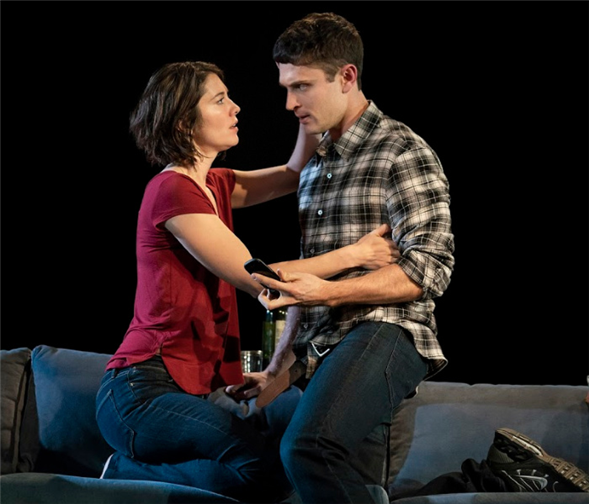Translate Page

Christopher Shinn didn't expect to helm the Second Stage revival of his play Dying City, but he's happy to help
---
When Lila Neugebauer had to bow out of directing the revival of Christopher Shinn's Dying City at Second Stage Theatre shortly before rehearsals began, the playwright didn't freak out, he stepped up. He wasn't worried that he had only helmed one previous production: his play Where Do We Live? at the Vineyard Theatre in 2004.
"I loved directing when I did that and it was well-received," says Shinn. "It was an experience I wanted to repeat at some point. But I'm not like obsessed with directing my own work -- which is obvious from the fact that I have only done it twice in 15 years."
Since Shinn had been involved in the preproduction process with Neugebauer, he felt it made sense for him to take over. "To choose another director -- even one I admired -- would mean that person would be inheriting a production that they didn't cast, or have any part in the design, or who hadn't been thinking about the work," he explains.
A finalist for the 2008 Pulitzer Prize for Drama, Dying City is an unsettling one-act about a young Iraq War widow (film and TV star Mary Elizabeth Winstead) who receives an unexpected visit from her dead husband's gay identical twin (Colin Woodell, who plays both brothers). While the setup may sound simple, their slippery interactions, plus unnerving flashbacks, explore the personal impact of traumatic global events such as war. Even though the play has enjoyed many successful stagings, including a critically acclaimed 2007 mounting at Lincoln Center Theater, Shinn went into this production with fresh eyes.
"I have a very bad memory for works of art -- including my own -- so I don't have a deeply developed point of view about any of my plays," he admits. "I don't want to say it felt like someone else wrote it, but it certainly felt like an unfamiliar work. It was 2005 when I wrote it and 2006 when it had its first production in London. In revisiting it I thought, you know, this is a really interesting play and I would like to explore it."
Shinn says his directing style is influenced by his work at London's Royal Court Theatre, which premiered his first play, Four, then commissioned several subsequent pieces. In rehearsals, the cast and creative team would do "a very deep exploration of what was on the page, attempting to unlock the script through the evidence of the text rather than turning to me and asking, 'What do you mean?'" Shinn recalls. "So my early experience with new plays never had the element of, 'Well, the playwright is here, let's just ask him.' It was really all of us trying to discover the play together."
Of course Dying City isn't a new play, yet Shinn approached it as if it were, delving into the script with his collaborators and remaining open to their insights. "This play can take on many different interpretations -- there's not just one way to do it," he says. "I wanted to follow the actors' instincts and build from what their sense of the characters were and work together from there. The goal was to create as organic a process as we could. I also learned that, although there is a tremendous amount of surface elements to the play -- how it looks, sounds, moves -- the really important aspect is invisible, what's inside. Directors I love have all different styles of working, but they all begin from that deep inner place."
While Shinn is enjoying his time in the director's chair, he's not aiming to switch careers. "If I'm lucky enough to start to have a few revivals, I would actually like those to be directed by other people," he says. "The exciting thing about revivals is seeing the new director's vision. Though works of mine are diverse, I've never had a person of color direct a major production of mine, and I've only had one major production directed by a woman. I would really like to see people from outside my identity as a white male direct the work and open up some new perspectives."
---
TDF MEMBERS: At press time, discount tickets were available for Dying City. Go here to browse our current offers.
Follow Frank Rizzo at @ShowRiz. Follow TDF at @TDFNYC.
Top image: Mary Elizabeth Winstead and Colin Woodell in Dying City. Photo by Joan Marcus.